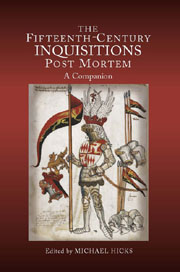Book contents
- Frontmatter
- Contents
- List of Tables and Figures
- List of Contributors
- Preface
- Glossary
- Abbreviations
- 1 Introduction
- 2 Crossing Generations: Dower, Jointure and Courtesy
- 3 The Lesser Landowners and the Inquisitions Post Mortem
- 4 Tales of Idiots, Signifying Something: Evidence of Process in the Inquisitions Post Mortem
- 5 The Value of Fifteenth-Century Inquisitions Post Mortem for Economic and Social History
- 6 ‘Notoriously Unreliable’: The Valuations and Extents
- 7 The Descriptions of Land Found in the Inquisitions Post Mortem and Feet of Fines: A Case Study of Berkshire
- 8 Re-assessing Josiah Russell's Measurements of Late Medieval Mortality using the Inquisitions Post Mortem
- 9 A Great Historical Enterprise: The Public Record Office and the Making of the Calendars of Inquisitions Post Mortem
- 10 Writs and the Inquisitions Post Mortem: How the Crown Managed the System
- 11 ‘Thrifty Men of the Country’? The Jurors and Their Role
- 12 Place-Names and Calendaring Practices
- Index
11 - ‘Thrifty Men of the Country’? The Jurors and Their Role
Published online by Cambridge University Press: 05 February 2013
- Frontmatter
- Contents
- List of Tables and Figures
- List of Contributors
- Preface
- Glossary
- Abbreviations
- 1 Introduction
- 2 Crossing Generations: Dower, Jointure and Courtesy
- 3 The Lesser Landowners and the Inquisitions Post Mortem
- 4 Tales of Idiots, Signifying Something: Evidence of Process in the Inquisitions Post Mortem
- 5 The Value of Fifteenth-Century Inquisitions Post Mortem for Economic and Social History
- 6 ‘Notoriously Unreliable’: The Valuations and Extents
- 7 The Descriptions of Land Found in the Inquisitions Post Mortem and Feet of Fines: A Case Study of Berkshire
- 8 Re-assessing Josiah Russell's Measurements of Late Medieval Mortality using the Inquisitions Post Mortem
- 9 A Great Historical Enterprise: The Public Record Office and the Making of the Calendars of Inquisitions Post Mortem
- 10 Writs and the Inquisitions Post Mortem: How the Crown Managed the System
- 11 ‘Thrifty Men of the Country’? The Jurors and Their Role
- 12 Place-Names and Calendaring Practices
- Index
Summary
Royal government in medieval England relied on the assistance and cooperation of local people. That was true not only of the crown's principal officers in the localities – sheriffs, escheators, commissioners and the like – but of the local juries on whose information so much of government relied. As royal government became increasingly intensive, from the thirteenth century, so the volume of work done by juries grew proportionately, and increasing numbers of people became directly engaged with the state. Recent work has emphasised that the growth of the state depended on the work of juries, and that jury service was ‘one of the state's biggest demands’. The scale of those demands required the involvement of a great number of jurors, many of them relatively humble. Juries were thus a forum where a wide range of local society, including peasants, actively interacted with central government. Or to put things more provocatively, peasants ‘participated in the crown's provincial politics’ through jury service, and ‘probably devoted more time to [the king's] provincial administration than did any other group in society’.
Yet we still know relatively little about the jurors at royal inquisitions in the fifteenth century. In general, these jurors have received less attention than their colleagues in the royal civil or, still more, the criminal courts; and the jurors of manorial courts have been still more intensively studied. More broadly, it can crudely be said that ‘peasants’ have largely been studied from the perspective of the manor, and that royal local government has been studied from the perspective of the gentry.
- Type
- Chapter
- Information
- The Fifteenth-Century Inquisitions 'Post Mortem'A Companion, pp. 201 - 222Publisher: Boydell & BrewerPrint publication year: 2012



